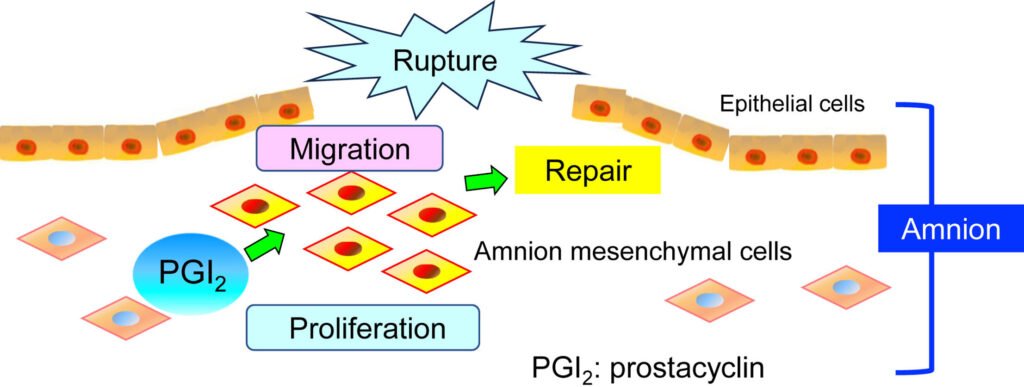A groundbreaking study published in The American Journal of Pathology has revealed a critical discovery regarding the repair of fetal membranes after premature rupture, shedding light on potential therapeutic strategies to prevent preterm birth. The research, led by Dr. Haruta Mogami and Dr. Masahito Takakura from Kyoto University Graduate School of Medicine, focused on the role of prostacyclin, a lipid molecule, in the healing process.
Preterm birth is a significant challenge in obstetrics, with infants born prematurely facing higher risks of mortality and morbidity. One of the leading causes of preterm birth is preterm prelabor rupture of membranes (pPROM), where the fetal membranes rupture too early. While spontaneous healing of fetal membranes is rare, the mechanisms underlying this process have remained poorly understood until now.
The study utilized a mouse model to investigate the repair and regeneration of ruptured fetal membranes, with a specific focus on prostaglandin signaling and the role of prostacyclin. The researchers found that prostacyclin signaling through the prostacyclin receptor (IP) was essential for promoting healing by stimulating the proliferation and migration of amnion mesenchymal cells at the rupture site.
Key findings from the study included the upregulation of genes responsible for prostaglandin signaling and prostacyclin at the rupture site, increased numbers of repair cells, and impaired membrane healing with pharmacological inhibition of the IP receptor. Additionally, experiments with IP-deficient mouse fetuses and human amnion mesenchymal cells confirmed the crucial role of prostacyclin in promoting membrane repair.
Dr. Takakura highlighted the surprising discovery that prostacyclin, traditionally known for its role in relaxing blood vessels, also played a vital role in wound healing at the ruptured amnion. The researchers emphasized that this finding could pave the way for new therapeutic strategies to manage pPROM and reduce the risk of preterm birth and infant mortality.
The study, titled “Prostacyclin Assists in the Repair of Ruptured Amnions through the Proliferation and Migration of Amnion Mesenchymal Cells,” provides a foundation for further research into enhancing fetal membrane healing. The researchers hope that their findings will eventually lead to the development of targeted treatments to improve outcomes for pregnant women at risk of preterm birth.
For more information on this groundbreaking research, the full study can be accessed in The American Journal of Pathology (2025), with a DOI of 10.1016/j.ajpath.2025.06.002. This study represents a significant step forward in understanding fetal membrane healing and brings hope for the future of obstetric care.


